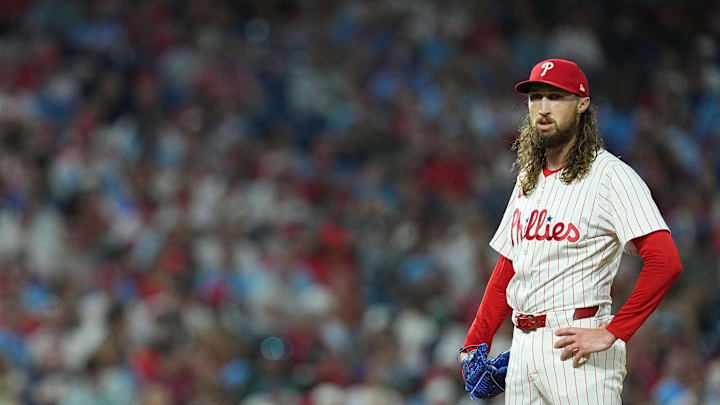In the pitch-tipping Olympics, the Los Angeles Dodgers have struck gold, finding a previously-unknown edge that helped them come from behind against Philadelphia Phillies relief pitcher Matt Strahm in Game 1 of the NLDS. It should come as no surprise that the Dodgers, of all teams, have an advantage in this department. They are the Dodgers, and seemingly do everything just a little bit better than their competition – even if some would consider it borderline cheating.
That being said, I should be clear here. Pitch tipping, and stealing signs via a tablet or in the dugout, is not cheating. It's well within fair play for a batter to pick up on the opposing pitcher's tendencies, or for those tendencies to be relayed to them at the dish before or in the middle of an at-bat. This isn't the Houston Astros sign-stealing scandal, as much as some fans would like to see the Dodgers caught in the act.
As long as baseball has been our national pastime, players have fought to gain every edge they can. Whether you're a fan of the Athletics or the Dodgers, you can rest assured your favorite players are watching film in the dugout and relaying what they perceive to be tells in a pitcher's approach. The Dodgers – and many of the teams remaining in this year's postseason – are just better at it than most. In the case of Strahm, the explanation was oh so simple, but something the Phillies didn't pick up on until it was too late.
For more news and rumors, check out MLB Insider Robert Murray’s work on The Baseball Insiders podcast, subscribe to The Moonshot, our weekly MLB newsletter, and join the discord to get the inside scoop during the MLB season.
How was Matt Strahm tipping his pitches against the Dodgers?
Despite holding a 3-0 lead over the Dodgers in Game 1, the Phillies couldn't add on against LA starting pitcher Shohei Ohtani. Come the seventh inning, the Dodgers were very much still in the game, and Strahm came in to shut the door in a critical late-inning swing. Following Game 1, MLB pundit Ben Verlander (yes, brother of that other Verlander) suggested Strahm was showing 'everything' to the Dodgers via a runner at second base. Strahm was quick to debunk this myth in a stern message on X.
"Ben I get stirring the pot is how ya make a living since baseball didn’t pan out. But go watch the game he did the same thing on different pitches. Oh and if ya know ball you’d know I’ve had my hands up the better part of a decade and have fingers together for all pitches," Strahm replied.
So, if it wasn't as simple as Strahm showing the Dodgers his pitch grip, then what happened? Andy McCullough, Dennis Lin and Cody Stavenhagen of The Athletic followed up with a rather simple explanation.
"When Philadelphia Phillies reliever Matt Strahm served up a go-ahead home run to Los Angeles Dodgers outfielder Teoscar Hernández in Game 1 of a National League Division Series on Saturday, Hernández’s teammate Andy Pages had raised his right arm moments before the pitch. Was Strahm tipping? Was Pages signaling the catcher’s location? Were the Dodgers simply bluffing? Either way, the ball landed in the seats, and the subject occupies the minds of pitchers across the sport," the trio wrote.
If Strahm is going to show the runner the inside of his glove and his grip, of course the Dodgers are going to take that: pic.twitter.com/MazjGTfsuD
— The WARmonger (@TheWARmonger_) October 5, 2025
One way or another, it sure appeared Pages picked up on a tell from Strahm, and Teoscar Hernandez cashed in with a home run of his own.
What can pitchers do to combat pitch tipping?
While Strahm may insist Pages wasn't able to pick up on his pitches by simply looking into his glove, the evidence suggests otherwise. Hernandez was able to lay off the right pitches, and then cashed in on a middle-out fastball that missed its location. Again, it didn't help that Strahm served up a meatball to Hernandez, one of the best postseason hitters on his generation, but Pages had a clear line of vision into the right-hander's glove.
The best way for Strahm – or any pitcher for that matter – to prevent tipping is to mix up their sequencing and signs. Pitchcom has revolutionized the way games are called, thus eliminating much of the need for catcher signs. However, it also puts extra onus on pitchers, which can be deemed a negative if, in Strahm's case, he's giving away those choices before they reach the catcher's mit.
“I always tell guys, too: the 2017 Astros still got out,” Strahm said before the postseason began. “Just make your pitch.”
If asked again to pitch in a high-leverage situation with runners on, Strahm ought to keep those Astros in mind.
